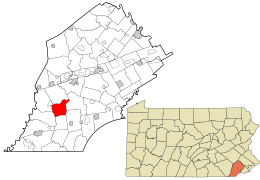Londonderry Township, Chester County, Pennsylvania
| Londonderry Township | |
| Township | |
| Country | United States |
|---|---|
| State | Pennsylvania |
| County | Chester |
| Elevation | 600 ft (182.9 m) |
| Coordinates | 39°52′31″N 75°52′25″W / 39.87528°N 75.87361°WCoordinates: 39°52′31″N 75°52′25″W / 39.87528°N 75.87361°W |
| Area | 11.3 sq mi (29.3 km2) |
| - land | 11.3 sq mi (29 km2) |
| - water | 0.0 sq mi (0 km2), 0% |
| Population | 2,149 (2010) |
| Density | 190.2/sq mi (73.4/km2) |
| Timezone | EST (UTC-5) |
| - summer (DST) | EDT (UTC-4) |
| Area code | 610 |
|
Location in Chester County and the state of Pennsylvania.
|
|
|
Location of Pennsylvania in the United States
|
|
|
Website: www |
|
Londonderry Township is a township in Chester County, Pennsylvania, United States. The population was 2,149 at the 2010 census.
In 1682, William Penn deeded 50,000 acres in what is now Londonderry Township to his relative John Fagg. It eventually developed into the crossroads community of Faggs Manor, Pennsylvania. Londonderry Township was officially created in 1734 when its Scotch-Irish immigrant residents voted to secede from Nottingham Township. It is named after the city of Londonderry, Ireland which is in present-day Northern Ireland.
The township was profiled in Witold Rybczynski's 2007 book Last Harvest: How a Cornfield Became New Daleville. He divided the population into four types: farmers, who made up only 10 percent of the population; large wealthy landowners, who make up another 10 percent and often raise horses; old suburbanites; and new suburbanites. The old suburbanites and new suburbanites have little in common but both oppose new development in the township.
The John Ferron House, Moses Ross House, and St. Malachi Church are listed on the National Register of Historic Places.
According to the United States Census Bureau, the township has a total area of 11.3 square miles (29 km2), of which 0.09% is water.
At the 2010 census, the township was 91.1% non-Hispanic White, 1.0% Black or African American, 0.8% Asian, and 1.0% were two or more races. 6.2% of the population were of Hispanic or Latino ancestry.
As of the census of 2000, there were 1,632 people, 525 households, and 410 families residing in the township. The population density was 144.0 people per square mile (55.6/km²). There were 539 housing units at an average density of 47.6/sq mi (18.4/km²). The racial makeup of the township was 95.53% White, 1.23% African American, 0.55% Asian, 2.27% from other races, and 0.43% from two or more races. Hispanic or Latino of any race were 9.31% of the population.
...
Wikipedia



